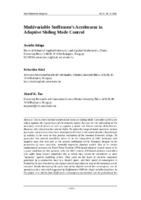Multivariable Steffensen’s Accelerator in Adaptive Sliding Mode Control

Megtekintés/
Metaadat
Teljes megjelenítés
Link a dokumentumra való hivatkozáshoz:
Gyűjtemény
Absztrakt
Due to their internal mathematical structure Sliding Mode Controllers (SMC) are
robust against the imprecisions of the dynamic model they use for the calculation of the
necessary control forces as well as against a priori not known external disturbances.
However, this robustness has natural limits. To widen the range of stable operation various
particular constructions have been developed and tested in the recent decades. Key element
of stability is the more or less precise realization of the invented kinematic design. To
guarantee that natural possibility seems to be the integration of SMC technique with
adaptive ones that also aim at the precise realization of the kinematic designs in the
possession of some available, normally imprecise dynamic model. Due to its simple
mathematical structure the Fixed Point Iteration (FPI)-based adaptive control seems to be
a good candidate for this purpose. Like the SMC control, FPI-based adaptive controllers
also suffer from certain limitations due to which they cannot be considered as some
“panacea” against modeling errors. They work on the basis of iterative sequences
generated by a contractive map in a Banach space, and their speed of convergence is
limited by the fact that during one digital control step only one step in this iteration can be
executed. Beside decreasing the cycle time of the digital control this convergence can be
speeded up by a witty trick suggested by Steffensen in 1936 for single variable functions. In
this paper it is shown how Steffensen’s convergence accelerator can be generalized for multiple variable Banach sequences. Following that simulation results are presented that
testify that the simplest SMC and the simplest variant of the FPI-based adaptive controller
using Steffensen’s generalized accelerator can be successfully integrated in the precise
control of a strongly nonlinear benchmark system consisting of two nonlinearly coupled
generalized van der Pol oscillators. Robustness of the integrated controller is also tested
against the modification of the control parameters. Furthermore, it is shown that the
sensitivity of the control to the measurement noise efficiently can be reduced by reducing
the cycle time of the digital control.
- Cím és alcím
- Multivariable Steffensen’s Accelerator in Adaptive Sliding Mode Control
- Szerző
- Atinga, Awudu
- Kósi, Krisztián
- Tar, József K.
- Megjelenés ideje
- 2024
- Hozzáférés szintje
- Open access
- ISSN, e-ISSN
- 1785-8860
- Nyelv
- en
- Terjedelem
- 26 p.
- Tárgyszó
- sliding mode control, fixed point iteration-based adaptive control, banach sequences, steffensen’s convergence accelerator
- Változat
- Kiadói változat
- Egyéb azonosítók
- DOI: 10.12700/APH.21.10.2024.10.26
- A cikket/könyvrészletet tartalmazó dokumentum címe
- Acta Polytechnica Hungarica
- A forrás folyóirat éve
- 2024
- A forrás folyóirat évfolyama
- 21. évf.
- A forrás folyóirat száma
- 10. sz.
- Műfaj
- Rövid közlemény
- Tudományterület
- Műszaki tudományok - anyagtudományok és technológiák
- Egyetem
- Óbudai Egyetem
